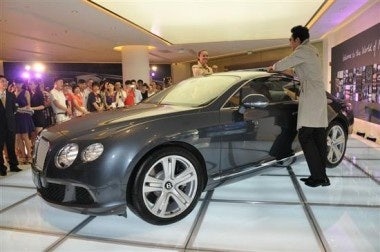Chinese Luxury Insiders Point To Concerns In City's Unique Private Lending Industry#

Models take part in the opening ceremony at Bentley's debut Wenzhou dealership this summer
Amid a simmering debt crisis made worse by dropping property prices and lingering global economic doldrums, the once red-hot luxury consumption that defined the southern Chinese city of Wenzhou (previously on Jing Daily) is now showing signs of cooling down. As the Wall Street Journal noted earlier this month, "the trust-based financing networks that took the place of banks in Wenzhou and fueled its binge are collapsing in the face of slowing exports, a trend made worse by Europe's economic woes." In the face of massive systemic problems caused by the breakdown of the city's trademark private lending industry -- which has, for decades, been a defining economic feature of Wenzhou -- retailers in the famously profligate city of 9.1 million are, for the first time in years, concerned. However, some industry observers are cautiously optimistic, noting that part of the reason for Wenzhou's cooling luxury market could come down to more rational spending among the city's middle- and upper-middle-class.
As the Wenzhou City News (温州都市报) writes this week (translation by Jing Daily team):
At the opening of the Fifth Wenzhou International Luxury Expo on November 19, exhibitors noticed far fewer people coming to visit, compared to previous years, and felt a decrease in spending power. Reporters have also noticed a similar lack of optimism taking hold at several high-end shopping centers in the city. Now the question remains: is Wenzhounese luxury consumption coming back to earth? Or has the private lending crisis had a real impact?
At 3:00 PM on November 20, reporters saw a sparse assemblage of guests coming by the Wenzhou International Convention and Exhibition Center to check out the Luxury Expo. Some exhibiting staff members stood around and chatted with one another, while others played videogames to pass the time and another napped in a chair.
"We haven't seen many people these past two days," one staff member at a luxury car display said, adding that most visitors just stopped by to take photos, with few actually buying. An information display put up by organizers said that it wasn't uncommon for over 100 million yuan (US$15.72 million) worth of luxury cars to be sold at the Wenzhou International Luxury Expo just a few years ago.
In the first half of this year, the [Beijing-based] "World Luxury Association" released its official 2011 Blue Book, which ranked Hangzhou, Wenzhou and Qingdao after Beijing, Shanghai and Guangzhou in terms of luxury consumption. The huge potential of the Wenzhou consumer market has, over the past several years, attracted a large number of international high-end brands. Currently, around 70 percent of the world's major luxury brands operate in Wenzhou.
Last year, Gucci settled in Wenzhou, achieving its annual sales goals within six months; Wenzhou became Omega's top sales market globally; daily sales of VERTU mobile phones (which range in price from 40,000-300,000 yuan) matched those in Beijing and Shanghai. In Wenzhou and its surrounding areas there are 10,000 Mercedes-Benzes and more than 17,000 BMWs -- accounting for nearly five percent of these cars in the entire country.
But over the course of the year, luxury consumption has gradually shrunk. According to a manager at a local luxury store, "Business started to decline in July of this year, and sales have really plummeted over the past month."
Industry sources point to two factors that have led to a "slump" in Wenzhou's luxury market. The crisis surrounding the city's private lending system has caused some people's personal wealth to shrink, leading to a decline in spending power. At the same time, to a certain extent, individual luxury consumption has become more rational. Wenzhounese have begun to focus on brand positioning and become more interested in brand experience, rather than blind consumption.
While it's entirely believable that many in Wenzhou are now thinking twice before taking another luxury shopping spree, the city's macroeconomic issues are unlikely to put a permanent crimp on high-end consumption. Even declining property prices in major Chinese cities are failing to curb luxury spending in any significant way. In comparison to major Western economies, where luxury purchases are usually the first to go in the face of economic concerns, the FT notes this week that "Asia is different in many ways – the identification of one’s self-worth with luxury brands is much more intense." Will this still be the case in Wenzhou?